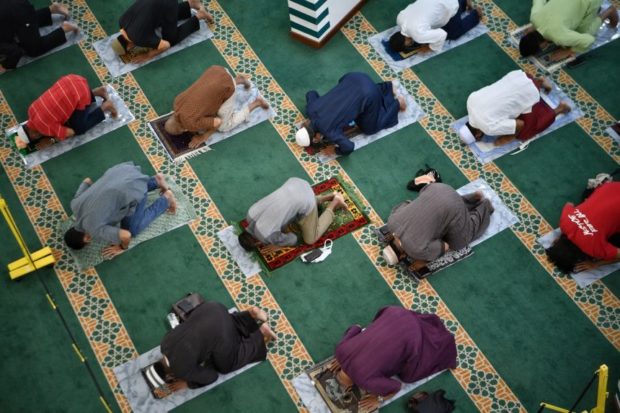
Muslims performing terawih prayers at Al-Muttaqin Mosque in Ang Mo Kio, on April 24, 2021. ST PHOTO: ARIFFIN JAMAR
SINGAPORE — Muslims are observing their second Ramadan in the grip of the Covid-19 pandemic.
But some essential activities like nightly terawih prayers and porridge distribution returned this year, restoring some familiarity to how the fasting month was marked prior to the pandemic.
Last year, mosques were closed during Ramadan because of Singapore’s circuit breaker to stem the spread of Covid-19.
A volunteer preparing dates and water for congregants to break their fasts before performing their daily Maghrib prayers at Al-Muttaqin Mosque. ST PHOTO: ARIFFIN JAMAR
Since they re-opened in June, mosques have been taking extra measures like disinfecting their compounds in between congregational prayers and ensuring that worshippers have a valid booking to facilitate contact tracing. These practices continued throughout Ramadan this year.
One volunteer helping to facilitate safe prayers is 16-year-old Serangoon Gardens Secondary School student, Muhammad Syafiq Mohd Sukairi, who has been active at Al-Muttaqin Mosque in Ang Mo Kio, helping out with terawih preparations.
He said: “I help out at the mosque about three to four times a week during Ramadan. I balance volunteering with my school work.”
Syafiq helps with sanitizing the prayer halls before and after congregational prayers and preparing light refreshments for worshippers breaking their fast, and serves as an usher for up to 250 of the faithful performing terawih prayers each night.
This was before the Islamic Religious Council of Singapore (Muis) announced a reduction in the number of worshippers allowed in mosques for each congregational prayer session from May 8, from 250 to 100.
People lining up outside Ghufran Mosque in Tampines on April 24 before porridge distribution began. ST PHOTO: ARIFFIN JAMAR
Ghufran Mosque in Tampines conducting their porridge distribution on April 24. ST PHOTO: ARIFFIN JAMAR
The customary distribution of porridge to the public has also returned at mosques and some community centers.
Outside Ghufran Mosque in Tampines on April 24, a queue formed before the porridge distribution, which started at 5pm. Mosque volunteers and staff were present to enforce social distancing.
Staff and volunteers of Al-Muttaqin Mosque having chicken rice and other snacks to break their fasts proper. ST PHOTO: ARIFFIN JAMAR
Muslims at Hajjah Fatimah Mosque along Beach Road performing ablution before going for their Terawih prayers. ST PHOTO: ARIFFIN JAMAR
Volunteers at Hajjah Fatimah Mosque cleaning up the mosque after ending their terawih prayers at around 9.45pm on April 22, 2021. ST PHOTO: ARIFFIN JAMAR
The mosque distributes 500 packets of porridge each day on weekdays, with an additional 100 each day on weekends.
As part of the effort to reach out to more people, Ghufran Mosque distributes almost half of its daily porridge portion at Our Tampines Hub (OTH), which is next to the mosque.
Muslim migrant workers living in dormitories have also been able to organize their own terawih prayers.
Muslim migrant workers at Westlite Kranji QBD collecting food to break their fasts. ST PHOTO: ARIFFIN JAMAR
Muslim migrant workers at Westlite Kranji QBD heading for terawih prayers within their dorm on April 29, 2021. ST PHOTO: ARIFFIN JAMAR
Mr Md Foridshek, dressed in white, leading terawih prayers at Westlite Kranji QBD on April 29, 2021. ST PHOTO: ARIFFIN JAMAR
When The Straits Times visited Westlite Kranji Quick Build Dormitory (QBD) on Thursday (April 29), several residents were mopping an open court after heavy rain to prepare for their terawih.
There are about 600 Muslim residents at Westlite Kranji, but only 40 people can perform prayers at a time due to space constraints.
At Westlite Kranji, Mr Md Foridshek, 36, is one of two appointed prayer leads (Imams) approved by Muis.
In Bangladesh, Mr Foridshek led up to 150 worshippers in prayer.
“I feel very honored that my friends in this dorm trust me to lead them,” he said.